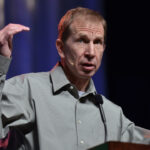This week Mike Bullmore sent this message to his congregation, CrossWay Community Church in Kenosha, Wisconsin. This has been lightly edited.
I feel—as I imagine you do—the dismay and sadness over what’s happening in and to our city. People’s lives here have been forever changed. A man likely paralyzed. A police officer’s reputation at stake. Fires burning. Businesses boarded up. People having to evacuate their homes. Most of us live here. Many of us grew up here. We love this place. There is such a great weight of grief we feel about all that’s happening.
But I’m also feeling the weight of responsibility to speak and provide some direction. But what does one say? What does one think to possibly say in the face of this civic unraveling? It almost feels more appropriate for us to be on our faces with our mouths in the dust.
Yet, I know that any clarity we gain in our thinking and relating is going to be the product of careful, patient, and extended work that will rely on reasonable discourse. I certainly don’t profess to have perfect understanding. I’m just burdened that we as Christians, and particularly that our churches, reflect the heart and mind of God as we process what’s going on in our nation.
So, I want to share with you a few things I’ve been thinking through. I’m praying they will be helpful.
1. We must insist that our thinking and acting be shaped by the truths and values in God’s Word.
We must be committed, in our own thinking, to the truth and reality that all people are created by God, in his image, and are therefore infinitely valuable with an eternal future at stake. Thus we have a responsibility before God toward every person with whom we come into contact.
I’m burdened that we as Christians, and our churches, reflect the heart and mind of God as we process what’s going on in our nation.
We must also be committed to the reality of sin. Sin permeates the human heart and produces all kinds of evil and senselessness. We must be especially committed to the truth that redemption is found only in Jesus Christ, the King of Peace, both for individuals and also the human race.
These are fundamental truths that cannot be compromised by pressure from any direction. We must be grounded in biblical truth and apply that truth to all of life.
2. We must not give up on reasonableness and the importance of truth.
One of the most distressing things about what takes place in these crises is our tendency toward reductionism.
Things are overly simplified. We make rash judgments. We may think, Why seven shots? We may think, Why didn’t he just stop and turn around? Each of us has felt the temptation to take a complicated situation and simplify it into the story we want to tell. We highlight certain details and dismiss others. There are, of course, many factors that contribute to tragedies like this. These factors need to be considered and weighed. The whole picture must be taken into account. That takes time and careful consideration. Quickly drawn conclusions and quick assignation of blame without due process don’t move us toward lasting solutions.
We Christians have to be committed to truth. Reasonable discourse will require great patience and humility. It will require people to actually respond to truth and adjust their thinking accordingly. But this is what will bear the fruit of justice and of peace. When I see this actually happening, in myself and in others, it gives me such hope.
Along these lines, I believe it’s important for us to be discerning in how we judge people’s motives. There are those who are seeking to be heard, trying to communicate that their situation is hard and has been hard. I’m speaking here of African Americans who are asking us to listen. Based on my experience as a white American, I might be tempted to be dismissive. But we can’t afford dismissiveness right now. We need to hear what’s being said. We must create space for these voices and for peaceful protest. Peaceful protest is not bad. Think of our own history, both religious and national, and the good that has come from peacefully confronting unjust institutions.
Separate from the legitimate desire to be heard, though, is the wanton burning and destruction. This, as well as the temptation to take justice into our own hands, can’t be condoned. It’s wrong and it’s senseless, and we must call it such.
3. We must actively pursue Christian virtue.
Commenting on what’s happening in our city, a friend said, “Most news we get we can’t do much about, but this is happening in our town, and we can play a role.”
We Christians have to be committed to truth.
For those of us nearby, there will be opportunities to serve, to concretely reach out to and care for those around us. This could be in a variety of ways. It could be volunteering to help clean up when the time comes.
For those further away, it could be simply reaching out with some expression of concern and solidarity to someone you know who’s been particularly affected. It could be getting on your knees and purposefully praying for Jacob Blake and his family, for the police officers and their families, for state and local leaders, for families displaced by the violence, for healing in our community. All it requires is a heart of love and some attention. Pray that God would open our eyes and give us hearts of compassion and readiness.
As I think about Christian virtue, I think also about how we speak—both face to face and also on social media. It’s so easy to voice our opinions. Our words can harm. Yet, thank God, the effect of our words can also help. Let us purpose to speak not just civilly, but with words that are gracious, apt, and edifying.
4. We must not, under any circumstance in this life, lose hope.
God has made great promises for both this life and the next.
I can feel so weary and discouraged at times, though. I have felt a deep sadness in these days. Tears well up at times. This is my hometown. I’m not intending to draw focus to myself or to garner pity; I’m simply communicating my sadness over the persistence and the devastation of sin. It makes me long for the world to come.
Do not put your hope in this world—in politicians, governments, material security, your own wisdom or wealth or strength. Put your hope in God.
The prophet Isaiah said, “Tell the righteous it shall be well with them” (Isa. 3:10). Or I think of Christ’s promise, “Let not your hearts be troubled. . . . I go to prepare a place for you and I will come again and will take you to myself that where I am you may be also” (John 14:1, 3). We’re given promises like these all over Scripture. God does this for a reason: he wants us to hear and believe. Our Lord knew we would need comfort from such promises. How we long for the day where we will dwell with our God! How our hearts should long for that time when there will be no more injustice or strife.
So, I want to say to you, “Christian, it shall be well with you.” Do not put your hope in this world—in politicians, in governments, in material security, or in your own wisdom or wealth or strength. Put your hope in God. Yes, in this world labor to think and live rightly for God’s glory and for the good of those around us now. But set your hope above. God has promised you rest. You will not be disappointed.
Search Us, O God!
I’d like to more explicitly address the issues facing us—racial tension and public justice—and, above all, the hope and promise of the gospel. But this will do for now. As a pastor, I simply wanted to share and ask you to consider these things with me.
Before anything else, run to our Lord and hide in him in prayer. And may we all be like David in Psalm 139: “Search me, O God, and know my heart! Try me and know my thoughts! And see if there be any grievous way in me, and lead me in the way everlasting!”
Is there enough evidence for us to believe the Gospels?
 In an age of faith deconstruction and skepticism about the Bible’s authority, it’s common to hear claims that the Gospels are unreliable propaganda. And if the Gospels are shown to be historically unreliable, the whole foundation of Christianity begins to crumble.
In an age of faith deconstruction and skepticism about the Bible’s authority, it’s common to hear claims that the Gospels are unreliable propaganda. And if the Gospels are shown to be historically unreliable, the whole foundation of Christianity begins to crumble.



































